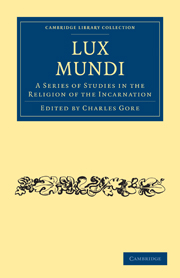Book contents
- Frontmatter
- ESSAYS AND CONTRIBUTORS
- PREFACE
- PREFACE TO THE FIFTH EDITION
- PREFACE TO THE TENTH EDITION
- Contents
- I FAITH
- II THE CHRISTIAN DOCTRINE OF GOD
- III THE PROBLEM OF PAIN
- IV PREPARATION IN HISTORY FOR CHRIST
- V THE INCARNATION AND DEVELOPMENT
- VI THE INCARNATION AS THE BASIS OF DOGMA
- VII THE ATONEMENT
- VIII THE HOLY SPIRIT AND INSPIRATION
- IX THE CHURCH
- X SACRAMENTS
- XI CHRISTIANITY AND POLITICS
- XII CHRISTIAN ETHICS
- APPENDIX I ON SOME ASPECTS OF CHRISTIAN DUTY
- APPENDIX II ON THE CHRISTIAN DOCTRINE OF SIN
XII - CHRISTIAN ETHICS
Published online by Cambridge University Press: 29 August 2010
- Frontmatter
- ESSAYS AND CONTRIBUTORS
- PREFACE
- PREFACE TO THE FIFTH EDITION
- PREFACE TO THE TENTH EDITION
- Contents
- I FAITH
- II THE CHRISTIAN DOCTRINE OF GOD
- III THE PROBLEM OF PAIN
- IV PREPARATION IN HISTORY FOR CHRIST
- V THE INCARNATION AND DEVELOPMENT
- VI THE INCARNATION AS THE BASIS OF DOGMA
- VII THE ATONEMENT
- VIII THE HOLY SPIRIT AND INSPIRATION
- IX THE CHURCH
- X SACRAMENTS
- XI CHRISTIANITY AND POLITICS
- XII CHRISTIAN ETHICS
- APPENDIX I ON SOME ASPECTS OF CHRISTIAN DUTY
- APPENDIX II ON THE CHRISTIAN DOCTRINE OF SIN
Summary
The study of early Church History suggests the conclusion that the Christian religion was recognised as a rule, or fashion of life, before it was discovered to be a philosophy and a creed. To be complete, therefore, any account of Christianity must include the presentation of it as a Divine ‘way of life’—a coherent system of practical ethics, marked by characteristic conceptions of freedom, duty, the moral standard, the highest end of life, and the conditions of human perfection. Such is the task we are about to attempt. To the necessary limitations of a sketch in outline, the reader may ascribe a general avoidance of controversial, and a preference for positive, statements; as also the fact that some large and interesting branches of the subject are dismissed with no more than a passing allusion.
It may be admitted, at the outset, that non-religious ethical speculation has in a measure paved the way for a re-statement of the Christian theory, by its inquiries into the source and nature—the rational basis and binding force—of moral obligation. For it may be maintained that in Christianity, rightly understood, is to be found an adequate answer to the question which all schools of thought agree in regarding as fundamental—the question ‘Why must I do right?’
On the other hand, the Christian Church claims to meet the plain needs of average human nature by her answer to the question, ‘How am I to do right?’
- Type
- Chapter
- Information
- Lux MundiA Series of Studies in the Religion of the Incarnation, pp. 340 - 382Publisher: Cambridge University PressPrint publication year: 2009First published in: 1889



